
Machines
Scope & Guideline
Advancing the frontiers of engineering and computer science.
Introduction
Aims and Scopes
- Mechanical Design and Analysis:
This area encompasses the design, modeling, and analysis of various mechanical systems including gears, motors, and robotic structures, emphasizing the integration of theoretical and practical approaches. - Control Systems and Robotics:
Research in this scope focuses on control strategies for robotic systems and automation, including adaptive control, reinforcement learning, and real-time control applications for autonomous vehicles and manipulators. - Manufacturing Technologies and Processes:
This includes studies on advanced manufacturing techniques such as additive manufacturing, CNC machining, and hybrid manufacturing processes, exploring their efficiency, sustainability, and quality control. - Fault Diagnosis and Predictive Maintenance:
The journal publishes methodologies for fault detection, diagnosis, and predictive maintenance of machinery, utilizing machine learning and data-driven techniques to enhance operational reliability. - Energy Efficiency and Sustainability:
Research addressing energy consumption, waste reduction, and sustainable practices in manufacturing and machine operation, highlighting innovative technologies that contribute to cleaner production methods. - Material Science and Engineering:
This area covers studies on the properties and performance of materials used in machine components, focusing on wear, fatigue, and the integration of smart materials in mechanical systems.
Trending and Emerging
- Artificial Intelligence in Mechanical Systems:
The integration of AI and machine learning in mechanical engineering applications is rapidly gaining traction, focusing on predictive maintenance, fault diagnosis, and optimization of control systems. - Sustainable Manufacturing Practices:
There is an increasing emphasis on research related to sustainability, including energy-efficient designs, eco-friendly manufacturing processes, and the application of renewable energy sources in machine operation. - Advanced Robotic Systems and Human-Robot Collaboration:
Research on collaborative robots (cobots) and their applications in various sectors is trending, with a focus on enhancing human-robot interaction, safety, and efficiency in shared workspaces. - Digital Twin Technology:
Digital twins are becoming a crucial area of research, enabling real-time monitoring and simulation of physical systems for improved design, maintenance, and operational efficiency. - Smart Materials and Structures:
The exploration of smart materials that can adapt to their environment or change properties under different conditions is emerging as a key research area, particularly in robotics and aerospace applications. - Robotics in Agriculture and Environmental Applications:
The application of robotics in agriculture, environmental monitoring, and disaster management is increasingly popular, reflecting the demand for innovative solutions in these critical areas.
Declining or Waning
- Traditional Mechanical Engineering Methods:
Research focusing solely on classical mechanical engineering methods without incorporating modern technologies like AI or machine learning appears to be waning, reflecting a shift towards more innovative approaches. - Conventional Material Processing Techniques:
Studies centered around traditional machining processes, such as manual machining and basic CNC techniques, are being overshadowed by advanced manufacturing technologies, particularly those involving automation and digitalization. - Static Mechanical Systems Analysis:
Analysis and modeling of static systems without dynamic considerations are becoming less common, as there is a growing emphasis on dynamic behavior and real-time analysis in mechanical engineering. - Basic Robotics Control without AI Integration:
Research on basic robotic control strategies that do not utilize artificial intelligence or machine learning techniques is declining, as the field increasingly embraces intelligent systems that enhance performance and adaptability.
Similar Journals
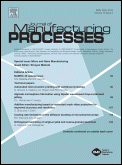
Journal of Manufacturing Processes
Unveiling Cutting-edge Research in ManufacturingThe Journal of Manufacturing Processes, published by Elsevier Science Ltd, serves as a premier platform for researchers, professionals, and students engaged in the fields of Industrial and Manufacturing Engineering as well as Management Science and Operations Research. With an impressive Q1 ranking across multiple categories for 2023, this journal not only showcases innovative research but also provides insights into strategic management and operational excellence within the manufacturing sector. Covering an extensive timeline from 1999 to 2024, the journal has solidified its position within the academic community, consistently ranking in the top percentile across various Scopus categories. Although it does not offer open access, the journal maintains a commitment to disseminating high-quality, peer-reviewed research that drives advancements in manufacturing processes. Located in the Netherlands, the journal aims to foster collaboration and knowledge sharing among scholars and industry experts alike, making it an indispensable resource for anyone dedicated to the advancement of manufacturing science.
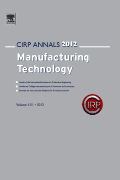
CIRP ANNALS-MANUFACTURING TECHNOLOGY
Unveiling the Future of Industrial InnovationCIRP ANNALS-MANUFACTURING TECHNOLOGY is a prestigious journal published by Elsevier, dedicated to advancing the fields of Industrial and Manufacturing Engineering and Mechanical Engineering. With an impressive impact factor placing it in the Q1 category for both disciplines, this journal showcases cutting-edge research that drives innovation and technological advancements in manufacturing processes and systems. Despite not being an open access journal, it is widely recognized for its rigorous peer-review process and high-quality content, including original research articles, reviews, and case studies that are essential for professionals, researchers, and students alike. The journal's long history since its inception in 1964 underlines its ongoing commitment to contributing significant knowledge in manufacturing technology. Its relevance is further emphasized by its strong Scopus rankings, placing it in the top percentiles of its categories, ensuring that it serves as a critical resource for anyone looking to stay ahead in the ever-evolving landscape of manufacturing technology.
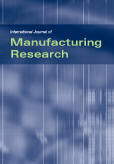
International Journal of Manufacturing Research
Driving Excellence in Industrial Research and DevelopmentThe International Journal of Manufacturing Research, published by InderScience Enterprises Ltd, serves as a pivotal platform for disseminating innovative research in the field of manufacturing and industrial engineering. With an ISSN of 1750-0591 and E-ISSN of 1750-0605, this journal commits to fostering advancements in areas including manufacturing technologies, control systems, and simulation methodologies. It has established itself within the academic community despite its Q4 category rankings in Computer Science Applications and Control and Systems Engineering for 2023, and it holds a notable position in Industrial and Manufacturing Engineering with a Q3 ranking. The journal reflects the dynamic nature of the manufacturing sector, providing a crucial forum for researchers, professionals, and students to contribute their findings and insights. Although it does not currently offer open access options, its comprehensive scope from 2006 to 2020 and 2022 to 2024 emphasizes its commitment to addressing contemporary challenges in manufacturing and technology. Engaging with this journal can enhance understanding and drive innovation among industry experts and scholars alike.

International Journal of Precision Engineering and Manufacturing
Innovative Insights: Shaping the Future of Manufacturing ExcellenceInternational Journal of Precision Engineering and Manufacturing, published by the Korean Society of Precision Engineering, is a key academic platform dedicated to the advancement of research in the fields of precision engineering and manufacturing. With an ISSN of 2234-7593 and an E-ISSN of 2005-4602, this esteemed journal caters to a diverse readership, including researchers, industry professionals, and students, who are committed to exploring innovative solutions in Electrical and Electronic Engineering, Industrial and Manufacturing Engineering, and Mechanical Engineering. Operating from South Korea, the journal has attained a commendable Q2 ranking in several engineering categories as of 2023, reflecting its influence and relevance in the academic community. Though it is not an open access journal, the International Journal of Precision Engineering and Manufacturing provides vital insights and updates in precision technology, bridging the gap between theory and practice. Researchers are encouraged to contribute to this evolving field and engage with high-quality studies that drive progress and innovation.

Transactions of the Korean Society of Mechanical Engineers A
Exploring the Frontiers of Mechanical Engineering Research.Transactions of the Korean Society of Mechanical Engineers A is a leading academic journal dedicated to the field of mechanical engineering, published by the Korean Society of Mechanical Engineers. With an ISSN of 1226-4873 and an E-ISSN of 2288-5226, this journal serves as a vital platform for disseminating innovative research and advancements in mechanical engineering. Situated in South Korea, the journal aims to foster knowledge exchange among researchers and professionals by publishing high-quality, peer-reviewed articles that cover a broad range of topics, including but not limited to manufacturing processes, thermodynamics, and materials science. Although it currently holds a Q4 ranking in the Mechanical Engineering category and is positioned in the 12th percentile of Scopus rankings, the journal is dedicated to expanding its impact and visibility in the global academic community. As it converges from 2007 to 2024, Transactions of the Korean Society of Mechanical Engineers A represents an essential resource for those seeking to advance their understanding and research within this dynamic discipline.

International Journal of Interactive Design and Manufacturing - IJIDeM
Pioneering Research in Interactive Design and ManufacturingInternational Journal of Interactive Design and Manufacturing (IJIDeM), an esteemed publication by SPRINGER HEIDELBERG, has carved a niche in the domains of Industrial and Manufacturing Engineering and Modeling and Simulation. Established in 2008, this journal serves as a critical platform for disseminating cutting-edge research and practical advancements related to interactive design and innovative manufacturing processes. With an impact factor that places it within the Q2 and Q3 quartiles of respective categories, and Scopus rankings affirming its relevance, IJIDeM invites contributions that explore the crossroads of design, technology, and engineering. Researchers, professionals, and students alike will find valuable insights and collaborations through its pages, making it a vital resource for anyone seeking to enhance their understanding of interactive design principles in manufacturing contexts.
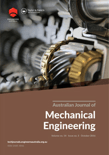
Australian Journal of Mechanical Engineering
Bridging Theory and Practice in Mechanical Engineering Excellence.The Australian Journal of Mechanical Engineering is a distinguished publication in the realm of mechanical engineering, dedicated to advancing the knowledge and application of engineering principles within the industry. Published by TAYLOR & FRANCIS LTD in the United Kingdom, this journal has been integral to the field since its inception, featuring a range of peer-reviewed research articles, reviews, and technical notes that collectively aim to bridge theoretical research with practical applications. With an impressive Scopus ranking of #271 out of 672 in Mechanical Engineering, positioning it within the 59th percentile, the journal continues to uphold rigorous academic standards, currently occupying Q3 in the 2023 quartile rankings. Researchers, professionals, and students alike will benefit from its comprehensive coverage and insightful contributions, providing a vital platform for knowledge exchange and innovation in mechanical engineering.

Frontiers in Mechanical Engineering-Switzerland
Exploring the Intersection of Engineering DisciplinesFrontiers in Mechanical Engineering-Switzerland, published by FRONTIERS MEDIA SA, is a pioneering open-access journal that has been fostering innovations in the field of mechanical engineering since its inception in 2015. Based in Switzerland, this journal provides a robust platform for disseminating cutting-edge research across multiple disciplines within mechanical engineering, including materials science, industrial and manufacturing engineering, and computer science applications. With impressive Scopus rankings, including Q2 statuses in key categories such as Industrial and Manufacturing Engineering and Mechanical Engineering, it stands out as a valuable resource for researchers and practitioners aiming to stay abreast of trends and breakthroughs in these fields. By embracing open-access principles, the journal ensures that high-quality research is readily available to a global audience, thereby promoting collaboration and knowledge sharing. As it continues to grow, Frontiers in Mechanical Engineering is poised to make significant contributions to both academic and professional communities, enhancing understanding and advancing practices in engineering disciplines.
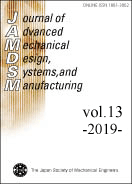
Journal of Advanced Mechanical Design Systems and Manufacturing
Connecting Researchers to Shape Engineering Excellence.The Journal of Advanced Mechanical Design Systems and Manufacturing, published by the Japan Society of Mechanical Engineers, is a pivotal scholarly platform dedicated to advancing knowledge in the fields of Industrial and Manufacturing Engineering and Mechanical Engineering. As an Open Access journal since 2021, it provides unrestricted access to high-quality research, facilitating broader dissemination and collaboration among researchers, professionals, and students globally. The journal's emphasis on innovative methodologies and cutting-edge technologies contributes significantly to the evolving landscape of engineering practices, with its research scope encompassing the latest advancements and applications in mechanical design and manufacturing systems. With a current impact factor that positions it in the Q3 quartile of both the Industrial and Manufacturing Engineering and Mechanical Engineering categories, along with its Scopus rankings further indicating its relevance in the field, this journal is an essential resource for those seeking to push the boundaries of mechanical engineering knowledge. For further inquiries or submissions, please reach the journal at its headquarters located at KDX Iidabashi Square Bldg, 2nd Floor, 4-1 Shin-ogawamachi, Shinjuku-ku, Tokyo, Japan.

Journal of the Brazilian Society of Mechanical Sciences and Engineering
Connecting experts to shape the future of engineering.The Journal of the Brazilian Society of Mechanical Sciences and Engineering, published by Springer Heidelberg, is a pivotal platform dedicated to disseminating cutting-edge research in the realm of mechanical sciences and engineering. With an ISSN of 1678-5878 and an E-ISSN of 1806-3691, this journal showcases innovative findings across various categories, including Aerospace Engineering, Automotive Engineering, and Industrial and Manufacturing Engineering. Notably positioned in the Q2 and Q3 quartiles of its fields as of 2023, the journal highlights the importance of rigorous scientific inquiry, contributing significantly to the understanding and application of engineering principles globally. With a Scopus rank reflecting strong performance in multiple engineering disciplines, this journal serves as an invaluable resource for researchers, professionals, and students seeking to advance their knowledge and explore the frontiers of mechanical sciences. The journal covers a broad range of topics and aims to facilitate collaboration and synergy among experts in the field, enhancing the overall impact of mechanical engineering research.